The School of Science provides a challenging, high-quality education to more than 1,000 undergraduate students studying across the sciences and mathematics and in interdisciplinary fields. As scientists and mathematicians, we believe that the discovery of new knowledge is inseparable from a continuous circle of learning and teaching. Our students and faculty collaborate in this research process as fellow explorers and mutual learners, advancing scientific frontiers for the benefit of society.
Academics Focused on Undergraduates
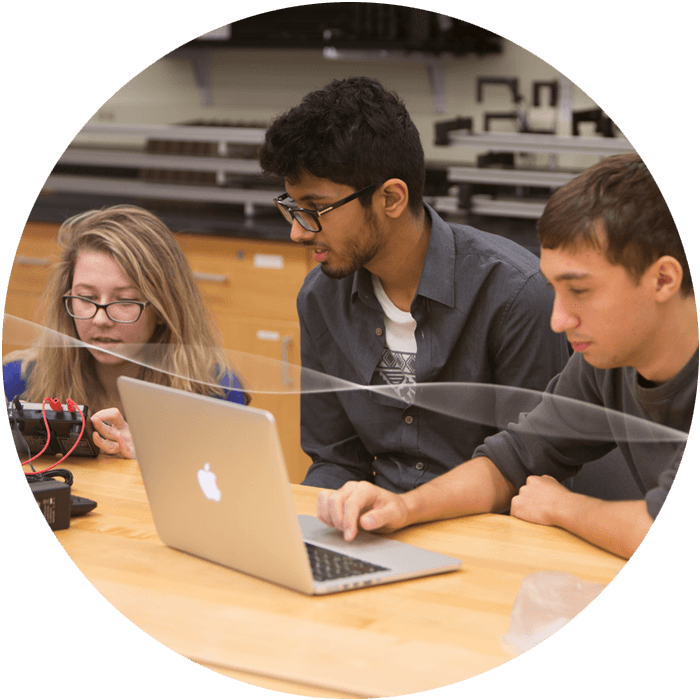 Our scientific community is both academically rigorous and personally supportive, emphasizing a deep level of engagement, a research-intensive curriculum, and close faculty mentorship. Students learn with outstanding teacher-scholars in five academic departments: Biology, Chemistry, Computer Science, Mathematics and Statistics, and Physics. All of our academic programs emphasize the excitement of scientific discovery and the critical contributions of scientists and mathematicians in our society. As scholars and researchers, faculty and students alike have full access to modern, well-equipped labs and specialized facilities in their pursuit of academic excellence.
Our scientific community is both academically rigorous and personally supportive, emphasizing a deep level of engagement, a research-intensive curriculum, and close faculty mentorship. Students learn with outstanding teacher-scholars in five academic departments: Biology, Chemistry, Computer Science, Mathematics and Statistics, and Physics. All of our academic programs emphasize the excitement of scientific discovery and the critical contributions of scientists and mathematicians in our society. As scholars and researchers, faculty and students alike have full access to modern, well-equipped labs and specialized facilities in their pursuit of academic excellence.
With no graduate students, all of our attention is focused on undergraduates. Over the past decade, we have deliberatively crafted an approach to the education of future scientists and mathematicians that integrates nine distinctive experiences, starting with faculty-mentored research. These experiences shape our nationally competitive graduates, who are equipped with the intellectual tools and scientific attributes that are valued across endeavors: Our graduates ask questions, seek knowledge, appreciate ambiguity, and thrive on the unexpected challenges of a rapidly changing world.
Students enjoy wide academic choices across all five departments, matching their scholarly interests and career goals with options that include majors, minors, and specializations. Curious and motivated, our students study across disciplines in self-designed majors or pursue innovative double majors: chemistry and art, biology and journalism, and more. The School of Science has a national reputation for academic quality and excellence, recognized as:
- in the top 1% nationally in graduating physics majors and #2 in the nation in graduating physics teachers,
- in the top 4% nationally for the number of chemistry majors graduating with American Chemical Society-certified bachelor’s degrees, and
- one of only three institutions to be recognized by the Council on Undergraduate Research as a national exemplar in providing high-quality research experiences to undergraduates.
Studying science or mathematics within the rich liberal arts education provided by TCNJ prepares students to be well-rounded, well-informed citizens, knowledgeable about the world, and ready to contribute to its progress.
Learn more about our nine distinctive experiences.
Research with World-Class Teacher-Scholars
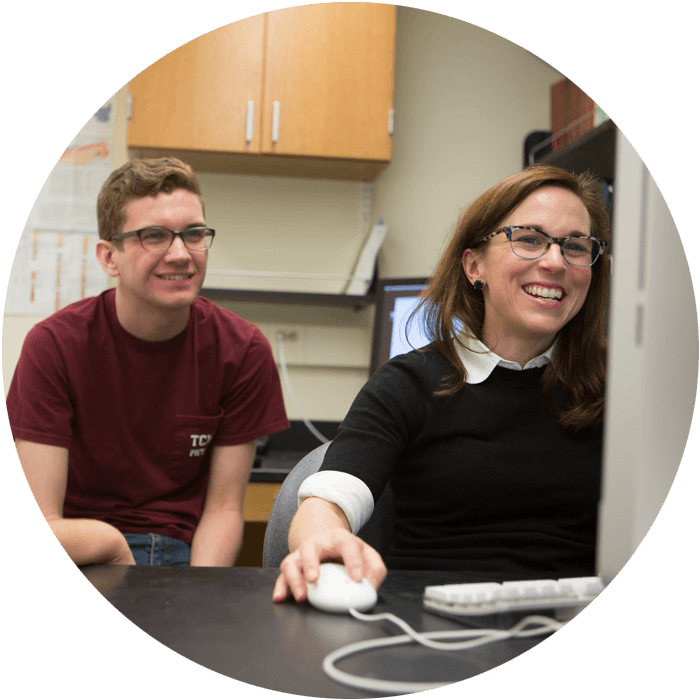 There’s a reason our faculty members prefer to be known as “teacher-scholars.” While running active research labs, they continue to put students first, both in and out of the classroom, serving as enthusiastic instructors, mentors, and advisers to their students. These inspirational faculty members welcome undergraduates on their lab teams and research projects, mentoring their work as junior collaborators who make valuable contributions. In fact, each year, nearly half of our students participate in mentored research or a research-based internship.
There’s a reason our faculty members prefer to be known as “teacher-scholars.” While running active research labs, they continue to put students first, both in and out of the classroom, serving as enthusiastic instructors, mentors, and advisers to their students. These inspirational faculty members welcome undergraduates on their lab teams and research projects, mentoring their work as junior collaborators who make valuable contributions. In fact, each year, nearly half of our students participate in mentored research or a research-based internship.
Our teacher-scholars are at the leading edge of their fields, with more than 50% having been hired within the past 10 years. The impact of their work in advancing science is reflected in high visibility on the academic stage. Over the past two years alone, our faculty members have:
- delivered invited lectures for prestigious academic organizations, including the International Congress of Mathematicians and the Ecological Society of America,
- published their research in books and peer-reviewed scientific and medical journals, including Nature and The New England Journal of Medicine, and
- shared their expertise through invited appointments to the National Science Foundation, the Institute for Advanced Study, the National Institute for Standards and Technology, and other institutions.
The innovative work of our faculty is increasingly recognized with external awards and grant support. This upswing expands student opportunities, providing scholarship support, curriculum enrichment, and access to state-of-the-art instrumentation as well as academic year and summer research experiences.
Students—the science and math innovators of the future—learn firsthand how to navigate the research process alongside their faculty mentors, from collecting and analyzing data to writing grant applications, publishing papers, and disseminating their research findings at national and international venues. Last year alone, our faculty-student research teams presented their work at more than 120 off-campus professional conferences. Put simply, our students are creating new knowledge and sharing it with the world.
Learn more about faculty-student research.
Deep Engagement in a Scholarly Community
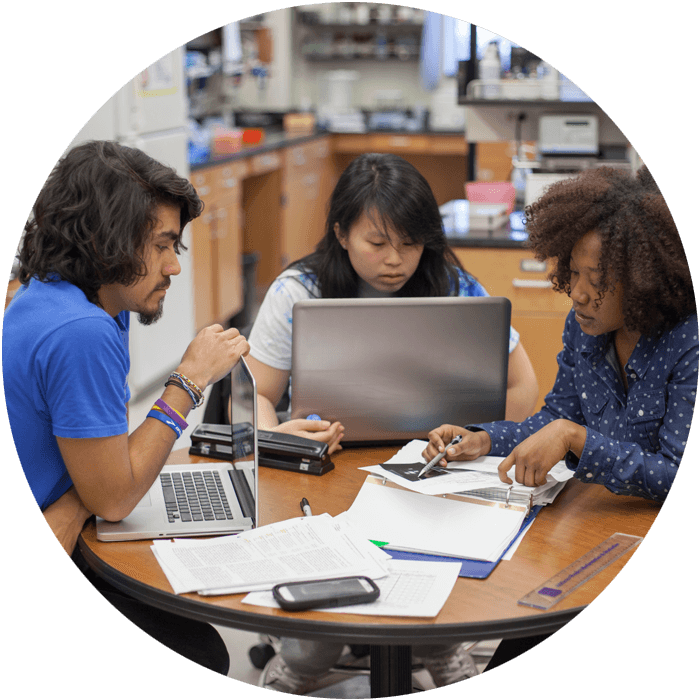 Ours is a deeply engaged scholarly community, where students are integral contributors to the intellectual and cultural life of the school and the college. At its foundation are small classes that average just 20 students and are always taught by faculty members—never teaching assistants. Our faculty members embrace teaching as a collaborative intellectual process, whether engaging students in vigorous classroom discussions or mentoring them in purposeful research experiences. This close interaction gives students the confidence to pursue scholarly journeys outside the classroom, on a campus with unlimited academic opportunities.
Ours is a deeply engaged scholarly community, where students are integral contributors to the intellectual and cultural life of the school and the college. At its foundation are small classes that average just 20 students and are always taught by faculty members—never teaching assistants. Our faculty members embrace teaching as a collaborative intellectual process, whether engaging students in vigorous classroom discussions or mentoring them in purposeful research experiences. This close interaction gives students the confidence to pursue scholarly journeys outside the classroom, on a campus with unlimited academic opportunities.
Students are strongly encouraged to conduct research, on or off campus, during the academic year, or over the summer, independently or as a member of a faculty-student research team. As junior collaborators on faculty-led research projects, our student’s author and co-author papers published in leading journals and present the results of their work at scientific conferences. Many of our students build on their TCNJ experience through research internships, national and international research fellowships, or research-based study abroad experiences.
The School of Science cultivates a dynamic learning environment. The school and each of our academic departments present a colloquium series every semester, bringing students and faculty together for scholarly conversations inspired by an array of speakers: Nobel laureates, industry scientists, field researchers, expert professors, science journalists, award-winning math teachers, and more. Each speaker spends a day or two on campus, visiting classes for in-depth discussions with students and engaging in personal conversations with students at receptions, lunches, and dinners.
Students network and develop leadership skills in dozens of student clubs and organizations based in the School of Science, including school government; student chapters of national honor societies; and special interest clubs focused on topics from astronomy to veterinary medicine, physics education to graduate school preparation, women in computing to minority students in pre-health studies.
By sponsoring campus-wide events, from star-gazing nights to the annual Week of Science, our student clubs and organizations help foster strong community connections among our departments and across our school. This sense of camaraderie encourages our students and faculty to come together socially, sharing the fun of a departmental picnic or a student vs. faculty volleyball competition, among other frequent activities.
Woven throughout our school’s academic, cultural, and social offerings is the lesson that science matters in everyday life, an essential truth that cuts across disciplinary boundaries and resonates on a global scale. A course combining art history, chemistry, and physics introduces students to the art and science of color. A series of service-learning projects and courses connect students in computer science, interactive multimedia, and journalism in producing a web-based database for Habitat for Humanity. Faculty-led travel-study courses immerse students in science topics on a global stage: atomic physics in Germany, and evolutionary biology in the Galapagos Islands.
These opportunities for deep student engagement model the cross-cultural, cross-disciplinary collaboration required of scientists and mathematicians in our globally connected, innovation-based, 21st-century workplace.
Learn more about student engagement.
Top-Flight Facilities for Research-Based Learning
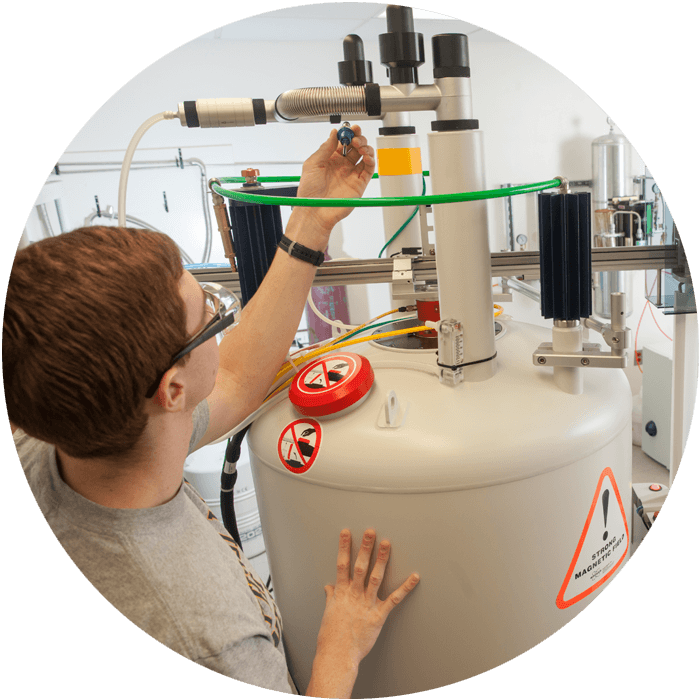 Students and faculty continue to push the boundaries of knowledge in our fully equipped, state-of-the-art science facilities. Our current Science Complex and Biology Building are recently constructed, providing research spaces and instrumentation that rival those of much larger universities. These spaces are specially designed to maximize collaborative learning among students and faculty in a research-based curriculum. Students have access to:
Students and faculty continue to push the boundaries of knowledge in our fully equipped, state-of-the-art science facilities. Our current Science Complex and Biology Building are recently constructed, providing research spaces and instrumentation that rival those of much larger universities. These spaces are specially designed to maximize collaborative learning among students and faculty in a research-based curriculum. Students have access to:
- Modern laboratories in optics, nuclear magnetic resonance, x-ray diffraction, cellular and molecular biology, neurobiology and physiology, and materials and nanoscience;
- Instrumentation suites, including spectroscopy and chromatography, molecular modeling, and imaging science (electron microscopy, confocal microscopy, atomic force microscopy);
- Specialized facilities, including a high-performance scientific computing cluster, planetarium, astronomical observatories, research greenhouse, and mathematics education laboratory;
- Computing spaces, including both mobile and stationary classrooms and workstation laboratories supporting multiple computational platforms (iOS, Android, Linux, Macintosh, and Intel); and
- Outdoor laboratories, including on-campus lakes and an on-campus ecological study forest.
Our STEM Complex underscores our commitment to fully integrating students into the knowledge-sharing environments of 21st-century science, technology, engineering, and math. Joining our current facilities will be an 89,000-square-foot STEM Building to support interdisciplinary faculty-student collaborative research; a 26,300-square-foot expansion of the Science Complex to include a chemistry addition; and a glass-enclosed Forum to create a unified STEM Complex by connecting facilities, disciplines, and scholars. In addition, both the current Science Complex and the Biology Building will be renovated and enhanced in a second phase of construction.
From new construction to new instrumentation, the School of Science continually modernizes to ensure our graduates remain nationally competitive for the best career and grad school placements. Among our latest acquisitions—included in more than $5 million of new scientific and computational equipment—are two advanced instruments: a field emission scanning electron microscope and an atomic force microscope. Usually reserved for use by faculty, postdoctoral fellows, and graduate students at top research universities, these instruments were customized to TCNJ specifications to support the work of our faculty-student research teams and to be used throughout our undergraduate curriculum.
Learn more about our facilities.
Student Accomplishment Leading to Lifetime Achievement
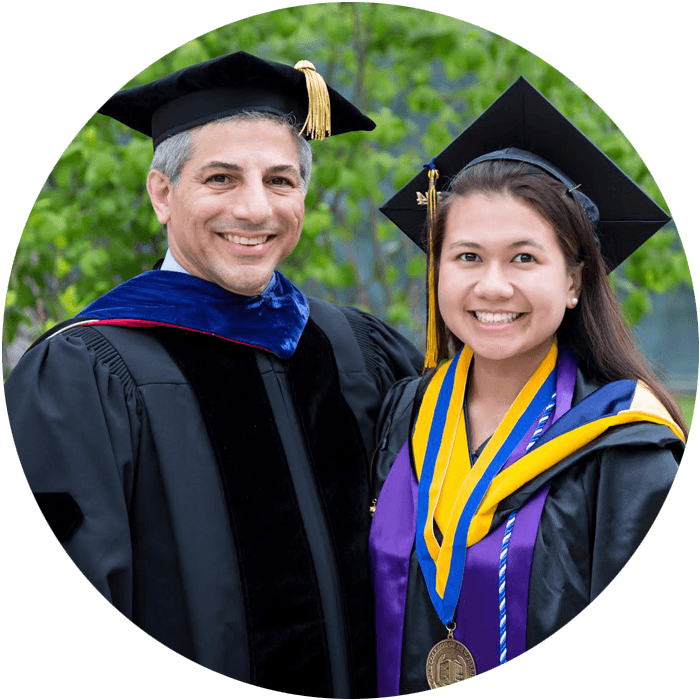 Our commitment to promoting deep student engagement and faculty-student research as central to a high-impact undergraduate experience is richly rewarded in the success of our students, while they are here and when they enter the wider world. Our students thrive within the teacher-scholar model of undergraduate education; among our talented student scholars, we are proud to count recipients of prestigious national and international fellowships, including:
Our commitment to promoting deep student engagement and faculty-student research as central to a high-impact undergraduate experience is richly rewarded in the success of our students, while they are here and when they enter the wider world. Our students thrive within the teacher-scholar model of undergraduate education; among our talented student scholars, we are proud to count recipients of prestigious national and international fellowships, including:
- a Fulbright Fellow, a biology major who is spending a year in Finland conducting research in evolutionary genetics,
- three Goldwater Fellows, who are using their two-year scholarships to conduct research in their junior and senior years, and
- a KPCB Fellow, a computer science major selected from among 2,000 applicants to intern with a Silicon Valley startup.
The School of Science educates scientists and mathematicians for success in the workplace, and we produce exemplary teachers in science and math classrooms across all grade levels. Our well-prepared students earn admission to prestigious graduate schools, including Harvard, Yale, Princeton, MIT, UCLA, UC Berkeley, Boston College, Penn State, University of Texas, and Rutgers. Many of our students enter law school or health professional schools. Our track record in medical school admissions surpasses the national average; 65% of TCNJ applicants are accepted to medical school, compared with 45% nationally.
TCNJ has been recognized by the U.S. Department of Education as one of 15 public higher-education institutions with the highest graduation rates leading to high incomes, a measure of our effectiveness in educating students who are well-prepared for today’s workplace. The School of Science tracks TCNJ’s exemplary success record, with 96% of last year’s graduating class employed or in graduate school within one year of their graduation.
